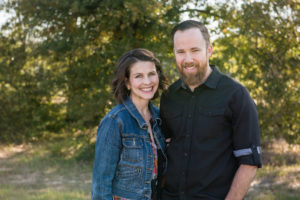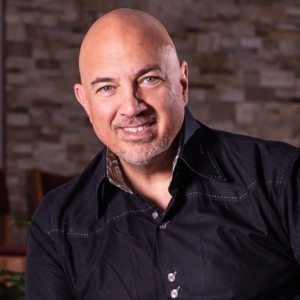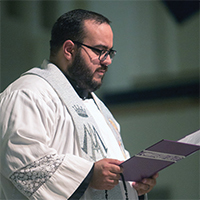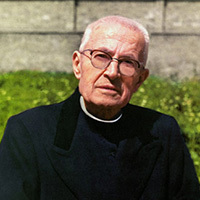~ 21 ~
NOT MY WILL BUT YOUR WILL ~
“My Father, if it is possible, let this cup pass from me.”
I prepare my heart for prayer
As I begin, I take a moment to become aware of the Lord present to me,
looking upon me with love, desiring to speak to my heart.
Prayerfully, I read Matthew 26:36-46
After prayerfully reading, I ask for a grace I desire in this time of prayer.
Using my reasoning:
• Think about what is happening in the scene; what are the action words?
• Who are the people in the scene? What is the place? What things are described?
• What words catch my attention? What does this mean to me?
Using my imagination:
• Imagining myself in the scene – am I an observer or participant? To whom am I drawn?
• Using all of my senses – what do I see? What do I hear? What do I feel, smell or taste?
Reflect on what God is saying to my heart:
• As I reflect, I use my spiritual senses to acknowledge what is transpiring in my heart – my thoughts, feelings and desires. (Acknowledge means to see, to notice, to become aware of, to name.) This is important to do, as my thoughts, feelings and desires shape my actions.
• I look for the truth the Lord is communicating to me. I ask Jesus to give me his mind and his thoughts to see with the eyes of his heart what he wants to reveal to me today. How is Jesus calling me to apply this truth to my life?
Guided Reflection
Quoted from “An Ignatian Introduction to Prayer,”
by Father Timothy M Gallagher,O.M.V1
I accompany Jesus as now he enters his time of sorrow, of burden, the time of the cross … I ask him to show me, through his cross, the meaning of my own sorrows and burdens …
I join Jesus and the Eleven as they walk alongside the city walls toward the Garden of Gethsemane … It is night … I hear the quiet sounds of the night, I feel the heaviness in the hearts of the disciples. My heart too knows times of heaviness and foreboding …
“My soul is sorrowful even to death …” With great reverence, I ponder the sorrow of Jesus, a deep sorrow that nearly overwhelms his life itself … What stirs in his heart? In my heart? I speak to him of my own sorrow …
Now I see Jesus go a little farther into the Garden … and he is alone. The three near him sleep. Humanly, he is utterly alone, in his time of need. My heart too knows what it means to feel alone … I speak to him …
His energy fails him … He falls on his face upon the earth, and a cry rises with anguish from his heart, to the Father: “If it is possible, let this cup pass from me …” There is in Jesus a deep, deep desire to be freed of the burden he carries, the burden that lies ahead: “If it be possible, let this cup pass from me…” How often I too have prayed that prayer: let this cup pass … the cup of physical weakness and pain, of responsibility, of struggles in relationships … I am there with Jesus, prostrate on the earth …
“Yet, not as I will, but as you will.” Two wills: “as I will,” “as you will.” And, though it costs his humanity so much, Jesus bows his will to that of the Father … I pray with him, I ask the courage to accept, like Jesus, the Father’s will in my life …
He comes, seeking the companionship and support of those close to him … and they sleep … But now I do not sleep … I speak to him …
I watch as, a second time, Jesus repeats his acceptance of the Father’s will: “My Father, if this cannot pass unless I drink it, your will be done.” And again, a third time … and still he is alone …
“Get up, let us go. Look, my betrayer is at hand.” His prayer has strengthened him, he is ready to face the cross … I pray for that same strength …
I ask for this grace in this time of prayer:
Converse with God2
Acknowledge:
• What are the thoughts arising in my heart? I think …
• What are the feelings arising in my heart? I feel …
• What are the desires arising in my heart? I desire …
Relate:
I honestly relate these to God; I talk to him about them, trusting he is present and listening
to me, his beloved child.
Receive:
• I listen to what the Lord wants to say to my heart, knowing his love is gratuitous and unconditional. I receive his love and consolation. I trust he longs to console me, to encourage me, to strengthen me, to heal me, to forgive me …
• I allow him to lead me; perhaps returning to the scripture …
Respond:
• I conclude my prayer time speaking to Jesus, God the Father, and/or the Holy Spirit as I would speak to a friend. I may also invoke the intercession of Mary and the Saints.
(St. Ignatius calls this a colloquy.)
Praise him – give glory to God for who he is; for being all good and loving; for being my Lord and savior …
Thank him – for our time together; for his word to me; for the gifts he has given me today …
Ask him – for his help, grace, strength, wisdom, deeper faith …
• Based on what God is saying to my heart, I resolve to act in the following concrete way to love God and love neighbor (which could be something small). Today I will …
Rest in the Lord: Be still and know that I am God
Psalm 46:10
1 Gallagher, T., 2008. An Ignatian Introduction To Prayer: Scriptural Reflections According To The Spiritual Exercises. New York: The Crossroad Publishing Company.
2 This way to converse with God in prayer often called ARRR is taught by The Institute for Priestly Formation out of Omaha Nebraska. For more information see Father Traynor, Scott (2013) The Parish as a School of Prayer and Dwyer, Karen and Lawrence (2011) WRAP Yourself in Scripture (IPF Publications).










 Kimberly Kay Cox
Kimberly Kay Cox







 Mark Mogilka
Mark Mogilka





























 Armando Cervantes
Armando Cervantes Anna Betancourt
Anna Betancourt
 Andrea Chavez-Kopp
Andrea Chavez-Kopp